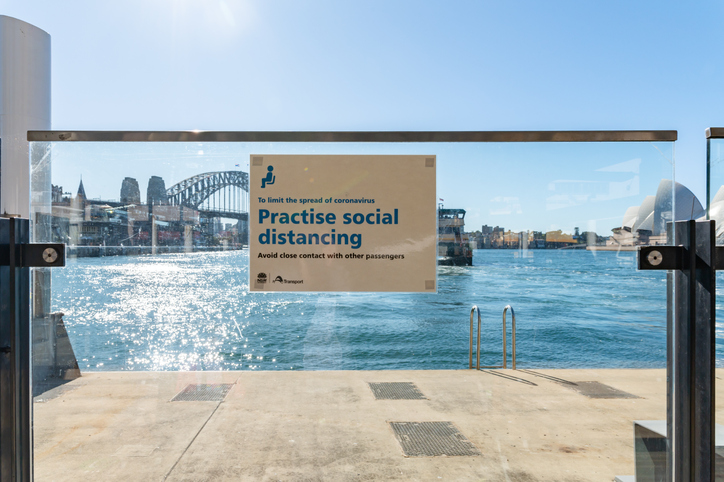
The Covid pandemic demonstrated how councils can complement higher levels of government during emergencies, and highlights the need for a stronger local government sector, a researcher says.

Dr Andy Asquith from the John Curtin Institute of Public Policy at Curtin University and international colleagues undertook a comparative study of how local governments across Australia, New Zealand, Canada and Italy responded to the outbreak of Covid during 2020.
Their paper, published in the Australian Journal of Public Administration, says that during the pandemic local government wasn’t just a passive ‘taker’ of policy from above, but acted as a policy ‘shaper’ and policy ‘maker‘ because of its local knowledge and ability to collaborate with community stakeholders.
There were many examples where local government showed initiative and innovation in supporting local businesses and vulnerable residents, the study found.
Local government was also important in supporting edicts around social distancing and travel restrictions, as well as communicating information about quarantines, curfews, and mask wearing to local communities.
Municipalities in all four countries also played a role in collecting and providing senior governments with information and data.
Dr Asquith says the pandemic highlighted the unique position of local government.
“One thing local government can do that no other agency can do is form local alliances, go to the community and say ‘I speak for you’, and bring together cross-sectional organisations to facilitate things happening in the locality,” he told Government News.
Who did it best?
Dr Asquith said in Australia, Italy and Canada, municipalities were able to mobilise resources to get things done. New Zealand, however, was the ‘outlier’ in terms of an effective Covid response, largely due to the country’s highly centralised system of government.
“In Australia local government was able to work with both the state and federal government to get things moving whereas in New Zealand local government just sort of shut shop and rolled over,” he said.
Australia: convening local groups
Australia’s existing local government disaster management frameworks for bushfires and flooding were quickly adapted to the pandemic response, the paper found.
The study says a hallmark of Australia’s response was the way councils convened local groups to advise them on implementing state and territory requirements.
Australian councils also worked with community groups to assist vulnerable community members, and with state health departments to support hygiene protocols and social distancing signage.
New Zealand: ‘a dog’s breakfast’
In terms of local government response to Covid, New Zealand did the worst out of the four countries studied, with researchers criticising it for it’s ‘inability to see the big picture’ and over-reliance on the national government to do things.
“New Zealand made a complete dog’s breakfast of it,” Dr Asquith told Government News.
The researchers found councils relied on civil society to provide social services like delivery of food parcels, while Auckland Council exploited the pandemic to seek “draconian cuts to its budget” beyond what was justified.
“In retrospect, local government was sidelined from the important decision-making processes,” the study concludes.
“There were few examples of local innovation or initiatives with respect to the pandemic response,” the paper says.
Canada: pedestrian-first streets
In Canada, many municipalities eased restrictions on parking and outdoor dining, and allowed small businesses to establish outdoor service stations where customers could collect food, drink, and other products.
Municipalities also lobbied local landlords to reduce rents for small businesses and to avoid evictions, and expedited planning applications.
Many larger cities experimented with pedestrian-first streets and promoted active transport. Mayors, councillors, and local medical health officers (MHOs) acted together to make decisions about school openings and closures.
Italy: extensive use of social media
The study says Italian municipalities were active in subsidising businesses, and providing social services, communication and local mobility and transport.
It also highlights their extensive use of social media to communicate, while several cities invested a significant amount of money in increasing cycle paths and electric micro-mobility to reduce passengers on public buses.
Highlighting strengths of local government
The researchers say the Covid-19 pandemic highlighted a range of areas where local government can play a key role, including:
- supporting local business
- financial aid and relief for the community
- local governance and administration
- supporting social well being and health
- communications
- transport and mobility
Dr Asquith says the Covid experience has shown that state and federal governments need to take local governments seriously, and invest money in ensuring a strong and competent sector.
“I would like to see both the state government and the feds give local government a bit more oomph to do stuff. And for that to happen local government has got to demonstrate that it can up its game,” he says.
Comment below to have your say on this story.
If you have a news story or tip-off, get in touch at editorial@governmentnews.com.au.
Sign up to the Government News newsletter